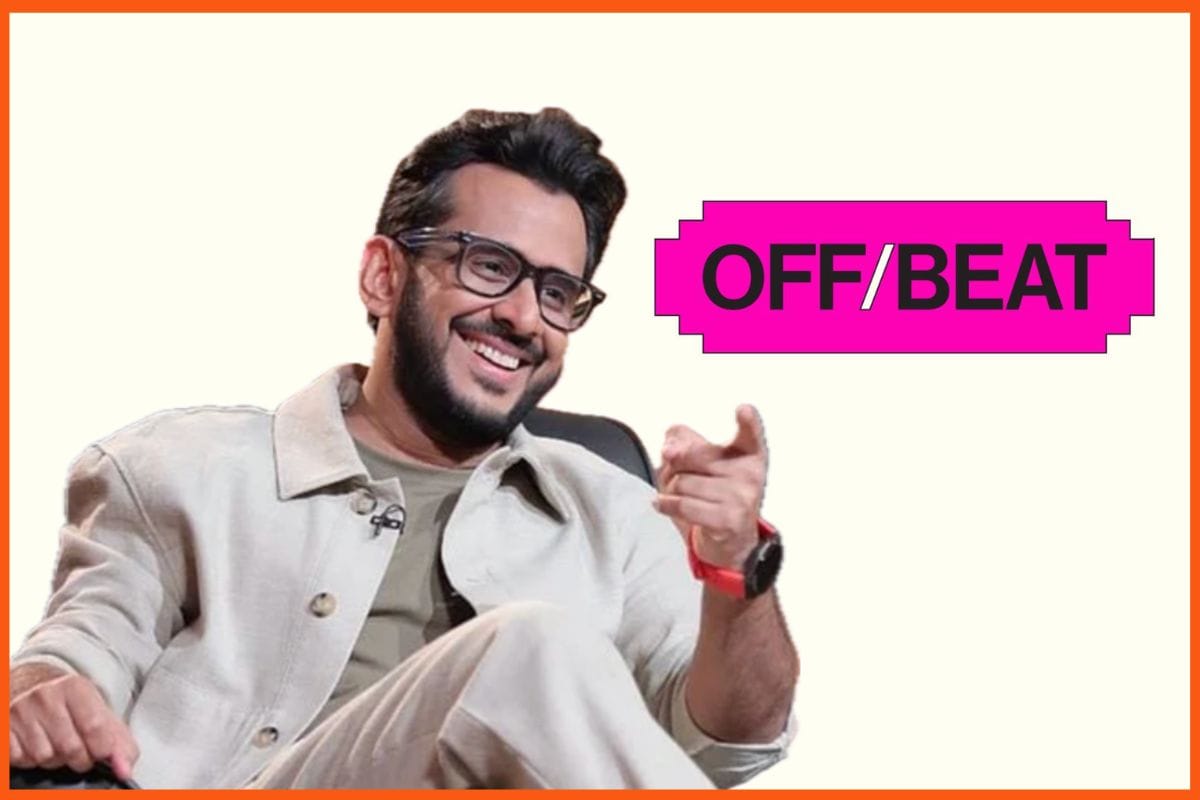Sudeep Kulkarni’s Game-Changer: Navigating the Future of Sports Tech With Game Theory
Year End Stories
StartupTalky presents Recap'23, a series of in-depth interviews where we engage with founders and industry leaders to explore their growth in 2023 and their predictions for the future.
The sports industry is a global powerhouse with a multi-billion-dollar market that encompasses professional leagues, equipment manufacturing, and media. Major events like the Olympics and FIFA World Cup generate massive revenue through sponsorships and ticket sales. Athlete endorsements and partnerships are crucial turning sports stars into influential figures. Technology, such as virtual reality and data analytics, revolutionizes training and fan engagement.
In 2022, the sports market was anticipated to achieve $2.65 billion in revenue, with industry revenue reaching nearly $487 billion. Projections indicated a compound annual growth rate (CAGR) of 5.2% between 2022 and 2023. The global sports market is expected to surpass $623 billion by 2027.
In a recent Recap'23 interview, we at StartupTalky had the privilege of connecting with Sudeep Kulkarni, Founder and CEO of Game Theory. We examined Game Theory's operations within the sports industry, analyzing their strategies and unique positioning.
StartupTalky: What inspired the founding of Game Theory, and how has the vision evolved since its inception?
Sudeep Kulkarni: Game Theory was inspired by the founders' understanding of challenges in the sports and fitness industry, evolving from insights gained in Sudeep's previous venture, "The Tribe." The vision shifted towards creating a seamless, engaging experience for real sports, simplifying scheduling, and improving player interactions by gamifying the entire experience.
Since its inception, Game Theory has transformed into a platform redefining sports participation challenges, offering professional sports experiences to all. Collaborating with prominent sports figures, powering coaching academies, and providing world-class facilities, the company now focuses on delivering the joy of playing sports and democratizing access through top-tier facilities and elite coaching. Positioned as the future of sports, Game Theory embraces innovation and technology to continually enhance user experiences.
StartupTalky: What is/are the USPs that set Game Theory apart in the sports-tech industry?
Sudeep Kulkarni: At Game Theory, our mission is to redefine the sports-tech industry with a set of Unique Selling Propositions (USPs) that truly distinguish us. We take pride in elevating the sports experience through extensive gamification, ensuring every aspect is engaging and contributes to a journey that users find immersive and enjoyable. What sets us apart from competitors is our strategic approach to facility utilization – a blend of leisure play and coaching for a sustainable growth model. Unlike merely focusing on availability, we prioritize strategic venue optimization. Our commitment is underscored by collaborations with renowned sports figures like Phelps Academy, Rohan Bopanna, and Pullela Gopichand. This highlights our dedication to powering coaching academies and delivering world-class facilities, ensuring that our users receive the best in sports training and experiences.
Democratizing sports is at the heart of our mission. We aim to make professional sports experiences accessible to everyone, delivering the ultimate joy of playing sports with top-tier facilities and access to elite coaching. Our strategy is infused with innovation and technology integration, leveraging cutting-edge trends such as AI, ML, computer vision, edge computing, wearables, and fitness tech.
StartupTalky: In what ways does Game Theory aim to make sports more accessible, enjoyable, and habit-forming for users? Are there specific strategies or technologies employed to cater to a diverse audience?
Sudeep Kulkarni: Game Theory is committed to enhancing the accessibility, enjoyment, and habit-forming nature of sports through a comprehensive approach. Leveraging specific strategies and cutting-edge technologies, the company has crafted a multifaceted initiative. The gamified experience stands as a cornerstone, where we incorporate gamification into every facet of the sports journey. This move aims to infuse an element of fun and competition, acting as a compelling hook to make sports more engaging and habit-forming for users.
In the realm of facility optimization, we distinguish ourselves from competitors by strategically blending leisure play and coaching. This unique approach ensures users have convenient access to top-tier facilities, fostering an environment that makes sports more accessible and enjoyable. Technology integration is a key element in Game Theory's strategy, incorporating cutting-edge trends such as AI, ML, computer vision, edge computing, wearables, and tech in fitness. This not only enhances the overall enjoyment of sports but also introduces technology as a motivational tool, creating an immersive and engaging sports experience.

StartupTalky: Can you elaborate on any 'gamified' elements integrated into Game Theory's offerings? How does the platform use features like automated scoring, game highlights, and stats to enhance user engagement?
Sudeep Kulkarni: We go beyond conventional sports engagement by integrating various gamified elements into its platform. The use of automated scoring streamlines the gameplay experience, providing precision without the need for manual scorekeeping. Additionally, the inclusion of game highlights adds a storytelling dimension, allowing users to relive and share their standout moments. Pro-sports-like statistics offer valuable insights into individual performance, fostering a data-driven approach for users to track progress and set goals.
Leaderboards and challenges introduce friendly competition, build a sense of community, and encourage ongoing participation. The rewards system further enhances user engagement by providing recognition and incentives for skill improvement. Through these gamified features, Game Theory creates an immersive and dynamic sports environment, making the platform not only a space for physical activity but also a compelling and enjoyable journey for users. Further in our technology roadmap, we aim to make video analytics a key feedback tool for even the casual player. With increased usage, our matchmaking capabilities help you get paired with a player of a similar skill set, making the game more intense and enjoyable.
Game Theory’s association with the likes of Phelps Academy and Rohan Bopanna is also a key offering for our users to not only access world-class centers but also enroll in coaching designed by the legends of the sport.
StartupTalky: How does Game Theory stay innovative and ahead in the sports technology space amidst rapid industry changes?
Sudeep Kulkarni: In the ever-evolving landscape of sports technology, we try to maintain our innovative leadership through a proactive and adaptable approach. The company integrates cutting-edge technologies, including AI, ML, and wearables, ensuring users experience the latest advancements for an engaging sports journey. Agile development methodologies allow for rapid adjustments and updates, enabling us to swiftly respond to industry changes and user feedback.
Our recent acquisition of Matchday.ai will further help accelerate the timelines on some of our innovative technology offerings.
Collaborations with renowned sports figures and institutions contribute expertise, while user feedback and data analytics drive informed decision-making and feature development. Actively engaging with government bodies and staying compliant with regulations ensures long-term sustainability. With a forward-thinking vision anticipating trends like augmented reality overlays, Game Theory not only keeps pace with industry changes but also leads in shaping the future of sports technology, providing users with a dynamic and futuristic sports experience.
StartupTalky: Are there specific features or updates geared toward user retention and satisfaction?
Sudeep Kulkarni: Game Theory strategically incorporates a range of features and updates aimed at bolstering user retention and satisfaction. The infusion of gamified elements, including automated scoring, game highlights, and statistics, fosters an engaging and competitive atmosphere, encouraging habitual use. A rewards system with virtual badges and recognition adds a layer of achievement, incentivizing regular participation and skill improvement. Leaderboards and challenges contribute to community building, providing users with a sense of camaraderie and motivation for ongoing involvement. Personalized coaching programs, facilitated through collaborations with sports figures, enhance the user experience by catering to diverse skill levels. The agile development approach ensures regular updates based on user feedback, demonstrating responsiveness to user needs. Technological advancements, including AI and ML, contribute to the platform's uniqueness, while active solicitation and integration of user feedback reinforce a user-centric focus. These collective efforts create a user-friendly and dynamic sports environment, promoting user satisfaction and fostering long-term engagement.
StartupTalky: Looking ahead, what are Game Theory's plans for expansion, both in terms of the user base and new features or games offered within the platform?
Sudeep Kulkarni: Looking ahead, we envision significant expansion across various fronts in our plans. Our primary focus is on broadening the user base to reach a diverse demographic, spanning from children to adults. We aim to make sports more accessible to a wider audience, promote active participation, and foster a healthy lifestyle.
We also aim to bring in a lot of additional features on both the app and the smart courts, elevating the user experience. Some of these developments will be brought about much earlier than anticipated, thanks to some of the strategic investments we have made in acquiring key assets and our hiring roadmap.
In terms of where Game Theory will be available to the users, our primary focus for 2024 will remain to create a stronger base in Bangalore by expanding to 200+ Badminton courts, 20+ Swimming pools & squash courts, and 40+ Tennis courts and football arenas.

StartupTalky: If applicable, how has any backing or mentorship from investors or industry experts influenced Game Theory's journey?
Sudeep Kulkarni: Early in our journey, we partnered with the Phelps Academy to bring swimming to our users. Our recent investors included Nithin Kamath of Rainmatter, who is a massive proponent of a healthy and active lifestyle, which is a great validation of our business and an enormous support for our roadmap. Another key investor in the recent round included Rohan Bopanna, who has not only brought in crucial capital to fuel our growth but also will partner with Game Theory to improve our tennis offering to our users.
StartupTalky extends its gratitude to Mr. Sudeep Kulkarni for dedicating his valuable time and generously sharing his insights with all of us.
Explore more Recap'23 Interviews here.
Must have tools for startups - Recommended by StartupTalky
- Convert Visitors into Leads- SeizeLead
- Website Builder SquareSpace
- Run your business Smoothly Systeme.io
- Stock Images Shutterstock






